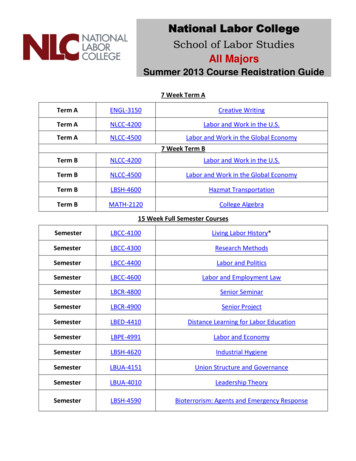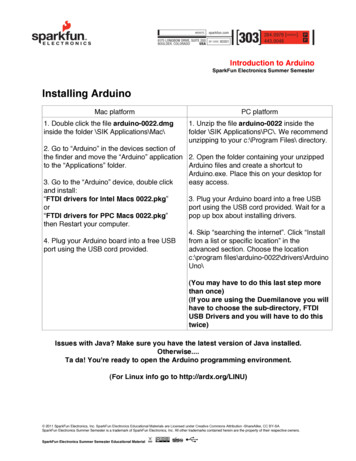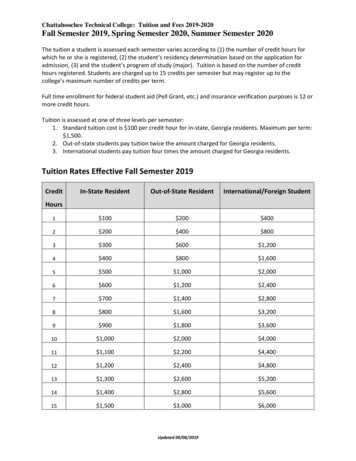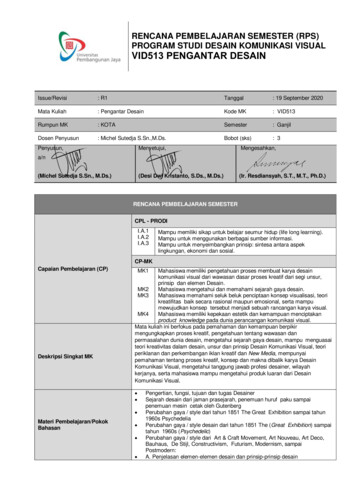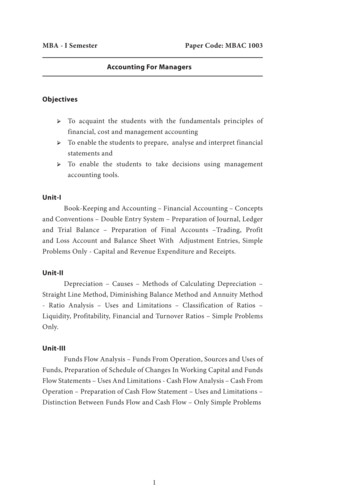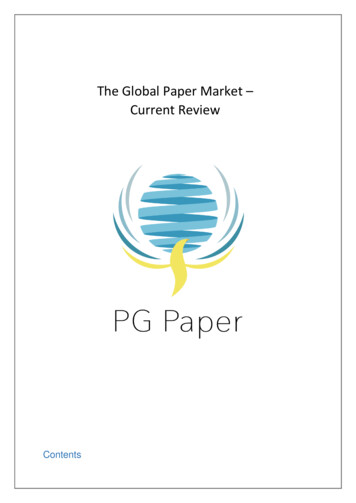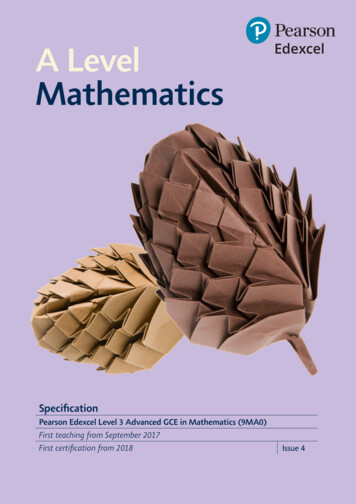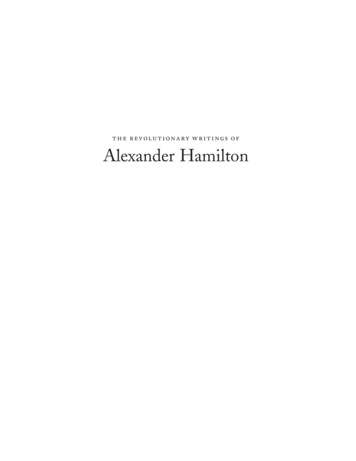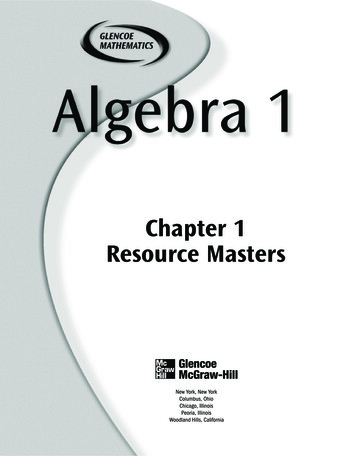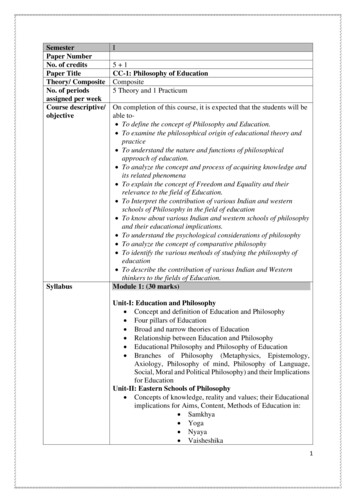
Transcription
SemesterPaper NumberNo. of creditsPaper TitleTheory/ CompositeNo. of periodsassigned per weekCourse descriptive/objectiveSyllabusI5 1CC-1: Philosophy of EducationComposite5 Theory and 1 PracticumOn completion of this course, it is expected that the students will beable to To define the concept of Philosophy and Education. To examine the philosophical origin of educational theory andpractice To understand the nature and functions of philosophicalapproach of education. To analyze the concept and process of acquiring knowledge andits related phenomena To explain the concept of Freedom and Equality and theirrelevance to the field of Education. To Interpret the contribution of various Indian and westernschools of Philosophy in the field of education To know about various Indian and western schools of philosophyand their educational implications. To understand the psychological considerations of philosophy To analyze the concept of comparative philosophy To identify the various methods of studying the philosophy ofeducation To describe the contribution of various Indian and Westernthinkers to the fields of Education.Module 1: (30 marks)Unit-I: Education and Philosophy Concept and definition of Education and Philosophy Four pillars of Education Broad and narrow theories of Education Relationship between Education and Philosophy Educational Philosophy and Philosophy of Education Branches of Philosophy (Metaphysics, Epistemology,Axiology, Philosophy of mind, Philosophy of Language,Social, Moral and Political Philosophy) and their Implicationsfor EducationUnit-II: Eastern Schools of Philosophy Concepts of knowledge, reality and values; their Educationalimplications for Aims, Content, Methods of Education in: Samkhya Yoga Nyaya Vaisheshika1
Mimamsa Vedanta Jainism Buddhism Islamic SchoolsUnit-III: Western Schools of Philosophy Concepts of knowledge, reality and value, their educationalimplications for aims, contents and methods of education in:o Idealismo Realismo Naturalismo Pragmatismo MarxismUnit IV: Psychological Considerations of Philosophy Representative proponents and thoughts related to:o Reconstructionismo Behaviourismo Existentialismo PostmodernismModule 2: (30 marks)Unit V: Comparative Philosophy Historical development of comparative philosophy Difficulties facing the comparative philosopher- chauvinism,skepticism, incommensurability, perennialism: prospects forcomparative philosophyUnit VI: Methods of studying Philosophy of Education Definition of methodology of philosophy, characteristics ofphilosophy:o Pre-Socratic philosophyo Dogmatismo Empiricismo Skepticismo Criticismo Rationalismo Dialectical methodo Logical Empiricism (Logical Analysis)o Positive Relativism Theory of Knowledge Euler Diagram Gettier Problem Knowledge buildingUnit-VII: Indian Educational Thinkers and their contributionin Education Swami Vivekananda2
Mode ofTransactionPracticumReadingsRabindranath TagoreMahatma GandhiAurobindoKrishnamurthiUnit-VIII: Western Educational Thinkers and theircontribution in Education Plato Aristotle Mary Wollstonecraft Paolo Freire Nel NoddingsLecture, Discussion, Case Study, Observation, Problemsolving, Film Show, ProjectStudents will be expected to undertake a project based on any one ofthe following questions or ideas arising out of different units of thesyllabus:1. The impact of the Educational Philosophy of any of the abovethinkers on the school curriculum today2. A comparative study on any one aspect of Eastern Philosophyversus Western Philosophy Altekar, A.S. (1934). Education in Ancient India. Delhi: IshaBooks. Aggarwal, J.C. (1993). Landmarks in the History of ModernIndian Education. New Delhi: Vikas Publishing House Broudy, H.S. (1977). Building a Philosophy of Education, NewYork: Kringer. Brubacher, J. S. (1962) Eclectic philosophy of education.Prentice Hall, New Jercy: Engelwood Cliffs. Brubacher, J. S. (1978). Philosophy of higher education. SanFrancisco: Jossey – Bass. Chakraborty, J.C. Modern Education. Kolkata: Usha PublishingHouse Chau M., Kerry T. (2008). International perspectives oneducation. New York: Continuum Chaube, S.P. (1994). Philosophical and Sociological Foundationsof Education. Agra: Vinod Pustak Mandir. Curren, R. (2003). A companion to the philosophy of education.Malden Mass: Blackwell . Dewey, J. (1944). Democracy and education. New York: TheFree Press Dhavan, M. L. (2005). Philosophy of Education, Delhi: IshaBooks. Freire, P. (1971). Pedagogy of the Oppressed. New York: Herdenand Herden Giroux, H.A., Penna, A.N., & Pinar, W.F. (1981). Curriculumand instruction. Berkeley, CA: McCutchan.3
EvaluationPaper Structure forEnd SemesterSemesterPaper Number Gupta, Renu (2011): Philosophical, Sociological and EconomicBases of Education, Ludhiyana: Tondon Publications. Mathur, S.S.: Sociological Approach to Indian Education, VinodPustak Mandir, Agra. Mukharji, S. (2007), Contemporary issues in modern Indianeducation. Authors Press. Naqi, M. (2005) Modern philosophy of education, New Delhi:Anmol Publication Pvt. Ltd. Nussbaum, M. (2010). Not for Profit, Why democracy needs thehumanities. Princeton: Princeton University Press Philosophical and Sociological Foundation of Education. Meerut:Surya Publications. Pringe, R. (2004). Philosophy of education: Aims, theory,common sense and research. London: Continuum Singh, B.N. (2005). Education:Social Change and EconomicDevelopment, Jaipur: RBSA Publishers. Singh, M.S. (2007). Value education. Delhi : Adhyayan,Publication Sodhi, T.S. &Suri, Aruna (1998). Philosophical and sociologicalFoundation of Education, Patiala: Bawa Publication. Taneja, V.R. (2002) Foundation of Education, Chandigarh:Mohindra Capital Publishers. Wynne, J. (1963). Theories of education. New York: Harper andRow. Saxena, S. (2001).Practicum: 20 MarksContinuous Internal Assessment: 20 marksEnd- Semester Theory Examination: 60 marksFull Marks: 60 Time: 3 HoursCommon Instructions: Answers should be based on critical reflection (knowledge,comprehension, application, analysis, synthesis andevaluation) Candidates are required to give their answers in their ownwords as far as practicableGroup A (From Module 1)I.Critical Essay: Answer any two questions out of fourquestions (2 x 10 20)II.Critical Short Notes: Answer any two questions out offour questions (2 x 5 10)Group B (From Module 2)III.Critical Essay: Answer any two questions out of fourquestions (2 x 10 20)IV.Critical Short Notes: Answer any two questions out offour questions (2 x 5 10)I4
No. of creditsPaper TitleTheory/ CompositeNo. of periodsassigned per weekCourse descriptive/objective5 Theory and 1 PracticumCC-2: Psychology of EducationComposite5 Theory 1 PracticumOn completion of this course, it is expected that the students will beable to: SyllabusUnderstand The different schools of Psychology andtheir significance in Education visualize multiple dimensions and stages of learner’sdevelopment and their implications on learning Deduce ideas about the theories of personality, theiruse in the development of learner’s personality. Conceptualize the theories of learning, motivationand their utility in the teaching-learning process. Explain the concept of growth and development andgain an understanding of different theories ofdevelopment as a basis of learning. Trace the changing concept of intelligence and itsapplication and understand the concept of creativity. understand individual difference and pupils’ readinesstowards learningModule 1 (30 Marks)Unit I: Schools of Psychology and their significance inEducation Behaviourism –characteristics and significance in Education Cognitivism- characteristics and significance in Education Constructivism- characteristics and types significance inEducation Humanism - characteristics and significance in EducationUnit II: Growth & Development with Specific Emphasis onEducation Growth & Development –characteristics and stages.Physical and Emotional Development Cognitive Development Including Language and MoralDevelopment-Piaget & Kohlberg Social and Emotional Development- Vygotsky & EricksonUnit III: Personality Concept and nature Of Personality and Type Theory-Jung Psychodynamic Theory (Freud) & Social Learning TheoryBandura Trait Theories of Cattle, Eysenck and Five Factor Model Humanistic Theory of RogersUnit IV: Intelligence, Emotional Intelligence and Creativity Intelligence- Concept, nature, types and measurement5
Mode ofTransactionPracticumEmotional Intelligence- Concept, nature, importance andmeasurementTheories of Intelligence- Cattell, Sternberg, GardenerCreativity- Concept, Factors, Measurement and NurturanceModule 2 (30 Marks)Unit V: Learning & Transfer of Learning Concept, Nature, Types Factors affecting learning- attention, interest, maturation,motivation Theories of learning- Tolman, Brunner, Lewin, Hull & Klob Transfer of Learning- Concept, types, theories, importanceand methods of enhancing.Unit VI: Motivation Motivation - Concept, types, factors affecting motivation,importance in education. Approaches to Motivation with specific emphasis on theireducational implication -Maslow's Hierarchy of NeedsTheory, Atkinson and McClelland’s AchievementMotivation Theory, Weiner’s Attribution Theory Determinants of Motivation- Locus of Control, Anxiety,Curiosity and Interest, Learned Helplessness, ClassroomEnvironment, Cooperative, Competitive and IndependentLearning Motivation and Learning Theories of Bruner and BanduraUnit VII: Memory & Forgetting Brief idea about Cognitive Neuroscience. Memory – concept, stages and types Multisystem model of memory Forgetting: Its Nature, Causes and importance(contemporary views) Factors affecting memory, ways of improvement OfMemoryUnit VIII: Instruction and Teaching Teaching & Instruction- Concept and Difference Types of Teaching – Micro-teaching, Simulated Teaching,Macro teaching, large group and small group teaching Stages of teaching (Memory, Understanding and Reflective) Instructional Design - Direct and Indirect Instruction,Programmed Instruction Cognitive Styles, Learning styles and Teaching StylesLecture, Discussion, Case Study, Test administration, Experiments,Problemsolving, Film ShowAdministration, scoring and interpretation of any standardizedtests on any one of the following attributes: Achievement Motivation6
Readings Self-Concept Learning Styles Allen, B. P. (2006). Personality Theories: Development,Growth, and Diversity (5th ed.). Anastasi Anne: Psychological Testing, McMillan Co. NewYork. Atkinson, J.W & Feather, N.T. (1960). Theory ofAchievement Motivation, New York: Wiley Publishers. Ausubel D.P. & Robison F.G. School learning: Anintroduction to Educational Psychology, New York Holt,Rinehart & Winston Inc 1969. Baron, R.A (2002) Psychology, Fifth Edition. Singapore,Pearson Education Asia. Benjamin B. Lahey (2002): Essentials of Psychology,International Edition, Mc Graw Hill Berk L. E. (2010): Child Development, (8th Edition).NewDelhi: PHI Learning. Bernard H.W.: Psychology of learning & Teaching, NewYork McGraw Hill B. Bhatnagar, S. (2002). Advanced Educational Psychology,Agra: Bhargava Book House. Bichler R.F. and Jack Snowman: psychology Applied toTeaching Houghton Miffin Company, Boston, 1986. Bigge M.L.: Learning Theories for Teachers, Harper andTow publishers, 1971. Bower G.H. and Hilgard E.R.: Theories of Learning,Prentice Hall of India, New Delhi. 1980 Bron, R.A & Allyn Bacon. (2002). Essentials of Psychology,Guwahati: Nibedita DK Distributors. Burger, J. M. (2010). Personality (8th ed.). Belmont, CA:Wadsworth Publishing Carol S. Dweck. (2000). Self-theories: their role inmotivation, personality, and development ( essays in socialpsychology) Psychology Press Chand,T. (2002). Educational Psychology, Agra: BhargavaBook House Charles N. Newmark: Major Psychological assessmentInstruments: Allyn And Becan Inc. Cobb, N.J. (2004). Adolescent: Continuity, Change andDiversity (5th Edition). New York: McGrawv Hill. Crow, R.B & Crow, A (1964). Educational Psychology,New Delhi: Eurasia Publishing House Daniel Goleman ‘Working with Emotional Intelligence1998’ Daniel Goleman: Emotional Intelligence, Bantam books1995.7
Douglas J. Hacker, John Dunlosky, Arthur C. Graesser.(editors) (1998) Metacognition in Educational Theory andPractice, Lawrence Erlbaum Associates. Mahwah, NewJersey. Edition, 1988.Douglas J. Hacker, John Dunlosky, Arthur C. Graesser(editors) (2009) Handbook of Metacognition in Education(Educational Psychology). Routledge, Taylor and Francis,New York.Gage and Berlinger: Educational Psychology, BostonHoughton Miffins Company 1984.Gordon, William J.J. (1961) Synectics: the development ofcreative capacity. New York: Harper and row, PublishersGuilford, J.P. (1967). The Nature of Human Intelligence,New York: McGraw HillHall, C.S & Lindsey, G (1978). Theories of Personality (3rdEd), New York: John WileyHays J.R.: Cognitive Psychology, Thinking and Creating.Homewood Illinoins. The DorseyHerenhahn B.R.: ‘An Introduction to Theories of LearningPrentice Hall InternationalHilgard and Atkinson: Introduction to Psychology, Oxfordand IBH Publisher, Bombay.Hilgard, E.O (1976). Theories of Learning (4th Ed), NewYork: Appleton Century Crgts WoodworthR.S. (1995); A Study of Mental Life, New York: Century.Jayaswal, R.L.: Foundation of Educational Psychology:Allied Publishers, Bombay. Jersey, 1989.Kundu, C.L.: Personality Development, Sterling publishersPvt. Ltd., New Delhi, 1989.Matthews, G., Deary, I. J., & Whiteman, M. C. (2009).Personality Traits (3rd ed.). New York:Mezirow, J. (2000). Learning as transformation: criticalperspectives on a theory in progress. San Francisco: JosseyBass.Passi B.K.: Creativity in education NPC Agra 1982.Pina Tarricone (2011) The Taxonomy of Metacognition.Britain, Psychology PressS. Owen, H. Parker Blount, Heny Moscow: EducationalPsychology – An Introduction Little,Schunk, D. H. (2007). Learning Theories: An EducationalPerspective (5th Edition). New York: Prentice Hall.Skinner C. E, (2003): Educational Psychology, FourthEdition, Prentice Hall of India Private Limited,Wiggins, J. S. (Ed.). (1996). The Five-Factor Model ofPersonality: Theoretical Perspectives. New York: GuilfordPublications8
EvaluationPaper Structure forEnd SemesterWordsworth B.J. Piaget’s: Theory of cognitive and affectiveDevelopment, New York Zanden, J.W.V., Crandel, T.L.N. & Crandell, C.H. (2007);Theories of Development of Human Development. Delhi:McGraw Hill. Ormrod, J.E. (2012). Essentials of educational psychology:big ideas to guide effective teaching. Boston, MA: PearsonEducation Inc. Parmeshwaran, E.G and Beena, C (2002) An invitation topsychology, Hyderabad, India, Neel Kamal Publications. Pina Tarricone (2011). The taxonomy of metacognition.Britain, Psychology Press. R. Riding (1998): Cognitive styles and learning strategies:understanding style differences in learning and behaviour.London, David Fulton Publishers. Robert J. Sternberg (2001): Perspectives on thinking,learning, and cognitive styles .The educational psychologyseries. Routledge publication. Schmeck Ronald.R (1988): Learning strategies and learningstyles (perspectives on individual differences). SpringerPublication. Schunk, D. H. (2007). Learning theories: an educationalperspective (5th Edition). New York: Prentice Hall. Weiten W & Lloyd M. A. (2007): Psychology applied tomodern life – adjustment in the 21st century , (8thEdition)New Delhi: Akash Press Delhi, Woolfolk, A (2009) Educational psychology, (12th Edition).Singapore: Pearson Education Inc.Practicum: 20 MarksContinuous Internal Assessment: 20 marksEnd- Semester Theory Examination: 60 marksFull Marks: 60 Time: 3 HoursCommon Instructions: Answers should be based on critical reflection (knowledge,comprehension, application, analysis, synthesis andevaluation) Candidates are required to give their answers in their ownwords as far as practicableGroup A (From Module 1)I.Critical Essay: Answer any two questions out of fourquestions (2 x 10 20)II.Critical Short Notes: Answer any two questions out offour questions (2 x 5 10)Group B (From Module 2)III.Critical Essay: Answer any two questions out of fourquestions (2 x 10 20)IV.Critical Short Notes: Answer any two questions out offour questions (2 x 5 10)9
SemesterPaper NumberNo. of creditsPaper TitleTheory/ CompositeNo. of periodsassigned per weekCourse descriptive/objectiveI5 1CC-3: Sociology of EducationComposite5 Theory and 1 Practicum SyllabusTo understand the concept and nature of EducationalSociologyTo analyze the relationship between Education andSocietyTo determine the relationship between Education andCommunityTo explore the role and impact of culture in EducationTo state the different types of values and the role ofvalue educationTo appreciate the significance of national integration,secularism and international understandingTo explain the importance of the theories of socialchangeTo evaluate the importance of the concept ofdemocracy in educationMODULE: 1 (30 Marks)Unit I: Concept and nature of Educational Sociology Concept and definition of Educational SociologyRelationship between Education and SociologyAgents of socialization of the childSociological aspects of educationFeatures of sociology of educationUnit II: Approaches to Sociology of Education Symbolic Interaction, Structural Functionalism and ConflictTheory. Concept and types of Social Institutions: Role ofFamily, School and Society. Concept of Social Movements,Theories of Social Movements:1. Relative Deprivation Theory2.Resource Mobilization Theory3.Political Process Theory4.New Social Movement TheoryUnit III: Social Group and Community Meaning of social group and communitySocial Group and Group DynamicsEducational functions of the communityInteraction between the school and community10
Education as a social processEducation as socializationSocial functions of EducationUnit IV: Culture and Education Meaning of cultureRole of Education in the preservation, transmission andpromotion of cultureCultural lag and Cultural DiffusionImpact of culture of educationModule 2: (30 Marks)Unit V: Value Education Meaning, nature and classification of valuesValue Development and programme of valuesValue education at different stages of educationUnit VI: Education for National Integration and InternationalUnderstanding Education in relation to secularismEducation for National IntegrationEducation for International UnderstandingEducational Implications of promoting secularism, nationalintegration and international understandingUnit VII: Education for Social Change Meaning and nature of social changeConcept of modernization and urbanization with referenceto the Indian society and their educational implicationsTheories of social changeUnit VIII: Education and Democracy Mode ofTransactionPracticumEducation and its relationship with democracy and freedomMeaning and characteristics of democracyWays of cultivating democracy and freedomConcept of equality of educational opportunitiesEducation of the socially and economically disadvantagedsectionsLecture, Discussion, Case Study, Problem solving, Film Show,SeminarA seminar on any one issue concerning the education of thesocially disadvantaged sections and prepare a file: Orphans Street children Juvenile in Conflict with Law Third Gender Women11
ReadingsSC/STReference Books Adisesaiah, W.T.V. & Pawansam, R. (1974). Sociology inTheory and Practice, New Delhi, Santhi Publishers.Aggarwal, J.C. (1985). Philosophical and sociological basesof education. New Delhi: Vikas Publishing House Pvt. Ltd.Aikara, J. (2004). Education-Sociological Perspective, NewDelhi, Rawat Publications.Bhat M.S. Educational Sociology, APH Publications, NewDelhi.Bhatia & Bhatia. (1992 ). Philosophical and sociologicalfoundations of education. New Delhi: Doaba House.Bhushan, V. & Sachdeva, D.R. (2008). An Introduction toSociology: New Delhi, Kitabmahal.Brown, F.J. (1947). Educational sociology. NewYork:Prentice Hall Inc.Chanda, S.S. & Sharma, R.K. (2002). Sociology ofEducation, New Delhi, Atlantic Publications.Chattopadhyaya (Ed) (2002). The cultural heritage of India.Vedanta Press (RK Institute of Culture)Chaube, S.P. (1994). Philosophical and SociologicalFoundations of Education. Agra: Vinod Pustak Mandir.Cook, L.A. & Cook, E. (1970). Sociological Approach toEducation, New York, McGraw hill.Dewey, J. (1916). Democracy and education. New York:Macmillan & Co.Dhiman, O.P. (2008). Foundations of education. Lucknow:Atma Ram & Sons.Durkheim (1956). Education and sociology. The free PressGupta, Renu (2011): Philosophical, Sociological andEconomic Bases of Education, Ludhiyana: TondonPublications.Havinghurst, R,J., & Neugarton, B.L (1967). Society andeducation. Boston: Allyn and Bacon.Hemalatha, T. (2002). Sociological Foundations ofEducation, New Delhi, Kanishka publications.Joyee, L.E. & Sanders, M.G. (2002). School, Family andCommunity Partnership, Guwahati: Nibedita BookDistributors.Mathur S.S. (1968). A sociological approach to Indianeducation. Agra: Vinod Pustak Mandir.Prasad, J. (2004). Education and Sociology, New Delhi.Kanishka Publishers and Distributors.Shah, B.V. & Shah, K.B. (1998). Sociology of Education,Jaipur: Rawat Publications.12
EvaluationPaper Structure forEnd SemesterSemesterPaper NumberNo. of creditsPaper TitleTheory/ CompositeNo. of periodsassigned per weekCourse descriptive/objectiveShukla, B.V. & Shah, K.B. (1985). Sociological Perspectivein Education, New Delhi, Chanakya Publications.Practicum: 20 MarksContinuous Internal Assessment: 20 marksEnd- Semester Theory Examination: 60 marksFull Marks: 60 Time: 3 HoursCommon Instructions: Answers should be based on critical reflection (knowledge,comprehension, application, analysis, synthesis andevaluation) Candidates are required to give their answers in their ownwords as far as practicableGroup A (From Module 1)I.Critical Essay: Answer any two questions out of fourquestions (2 x 10 20)II.Critical Short Notes: Answer any two questions out offour questions (2 x 5 10)Group B (From Module 2)III.Critical Essay: Answer any two questions out of fourquestions (2 x 10 20)IV.Critical Short Notes: Answer any two questions out offour questions (2 x 5 10)I5 1CC-4: Educational Measurement & EvaluationComposite5 Theory and 1 PracticumOn completion of this course, it is expected that the students will beable to Acquaint themselves with the basic concepts andpractices of evaluation in education.Understand test construction and its process.Develop skills in scoring and reporting the evaluationOrient the students about contemporary methods ofevaluation.Help the student understand the relationship betweenmeasurement and evaluation in education.Orienting the student with tools and techniques ofmeasurement and evaluation.Develop skills and competencies required forconstructing, standardizing and using various tools and13
tests for measuring both cognitive and non-cognitiveaspects/domainsSyllabusMODULE 1 (30 Marks)Unit I: Concepts in Evaluation Evaluation: concept and needInterrelationship between measurement and evaluation ineducationProcess and types of EvaluationObjectives and Taxonomies of Educational ObjectivesCompetency Based EvaluationCriteria for teacher evaluation (Product, Process and Presagecriteria)Unit II: Test Construction and its Standardization-I Construction of a standardized test (NRT & CRT)Issues and Biases with TestingWriting test items – objective type, essay type andinterpretive typeBasic characteristics of good measuring instruments –Validity, Objectivity, Reliability, Usability and Norms.Types of Reliability and ValidityUnit III: Scoring and Reporting in Evaluation True scores and Errors of MeasurementDistractor analysis and Item analysis procedures for NRTand CRTConcepts of Percentile and Standard scores (Z-Score,Stanine & C-Score)Concept of Mastery LearningUnit IV: Contemporary Techniques of Evaluation Formative and Summative EvaluationContinuous and Comprehensive evaluation (CCE).Question Bank, Semester, Continuous Internal Assessmentsystem, Grading, Portfolio AssessmentComputerized and Online EvaluationOpen Book ExaminationModels in Educational Evaluation–3D Model, Total Modeland Individual Judgment ModelMODULE 2 (30 Marks)Unit V: Basics of Measurement Measurement: Concept, relevance, function and scopeLevels of measurementLimitations of test and measurementRelationship between Measurement and EvaluationThe status of educational measurement in India14
Unit VI: Assessment Meaning, nature, types and perspectives (assessment forLearning, and assessment of learning)Assessment of Cognitive (Anderson and Krathwohl),Affective (Krathwohl) and psychomotor domains (R.H.Dave) of learningAssessment in Pedagogy of Education: Feedback Devices,Assessment of Portfolios, Reflective JournalRubrics for Self and Peer evaluation, Field Engagementusing RubricsAssessment in Andragogy of Education - InteractionAnalysis: Flanders’ Interaction analysis, Galloway’s systemof interaction analysis (Recording of Classroom Events)Unit VII: Test Construction and its Standardization -II General principles of test construction and itsstandardizationWriting test items – objective, essay and interpretativeComparison of teacher made test and standardized testProcess of Test StandardizationConstruction and Interpretation of Interaction MatrixUnit VIII: Measurement of Psychological TraitsMode ofTransactionPracticum Need and use of psychological test in education Achievement, and Interest Aptitude, and Attitudes Skills, and Personality Creativity, and Intelligence Subjective and Objective Tests Sociological, Projective and Special TestsLecture, Discussion, Case Study, Questionnaire construction andadministration, Experiments, Problem solving, Film Show Construct two questionnaires: One for the student and Onefor the teacher Each questionnaire has 20 questions The questionnaire for the students will be administered on10 students of different levels in Colleges or Schools The questionnaire for the teachers will be administered on10 teachers of different levels in Colleges or Schools The data will be analyzed and a report will be submitted onany one of the following topics: The problems in Summative and FormativeEvaluation faced by teachers and students ofSchools or Colleges The challenges in the Computerized and OnlineEvaluation System faced by students and15
ReadingsEvaluationPaper Structure forEnd Semesterteachers in Educational Institutions (Collegesor Schools) Anastasi, A: Psychological Testing (Fifth-21) MacmillanPub. Co. Inc. New York. Arun Kumar Singh: Tests, Measurement and ResearchMethods in Behavioral Sciences, New Delhi , Tata McGrawHill Publishing Company limited,1986. Ebel, R.L: Essential of Educational Measurement, (ThirdWill Prentice Hall Inc. New Jersey. (1970). Ferguson, G A: Statistical Analysis in Psychology andEducation, McGraw Hill International Book Co. (1981). Agarwal, Y.P. (1998), Statistical Methods, Sterling, NewDelhi. Lindquist, E.F ; Statistical Analysis in EducationalResearch; Calcutta, Oxford &IBHPublishingCo.1970· Garrett, H.E.: Statistics In Psychology And Education:Vikas Peffer & Smara Co., Ins, NewYork. Cronbach, L.J: Essential of Psychology Trends Harper Row,New York. Guilford, J.P: Fundamental Statistics in Psychology andEducation, McGraw Hill(1965). K V S Sharma, (2001) Statistics made Simple Do it Yourselfon PC; New Delhi, Prentice Hall of India, Private IndiaLimited. M Rajamanikram; Statistical Methods in Psychological andEducational Research, New Delhi, Concept PublishingCompany,2001Practicum: 20 MarksContinuous Internal Assessment: 20 marksEnd- Semester Theory Examination: 60 marksFull Marks: 60 Time: 3 HoursCommon Instructions: Answers should be based on critical reflection (knowledge,comprehension, application, analysis, synthesis andevaluation) For questions based on numericals, step-by-step explanationof the process and formula used and interpretation of theresult along with educational implications is required Candidates are required to give their answers in their ownwords as far as practicableGroup A (From Module 1)I.Critical Essay and Numerical Problem: Answer anytwo questions out of four questions (2 x 10 20)16
II.Critical Short Notes with Numerical Problems:Answer any two questions out of four questions (2 x 5 10)Group B (From Module 2)Critical Essay: Answer any two questions out of fourquestions (2 x 10 20)Critical Short Notes: Answer any two questions out offour questions (2 x 5 10)III.IV.SemesterPaper NumberNo. of creditsPaper TitleTheory/CompositeNo. of periodsassigned per weekCoursedescriptive/objectiveSyllabusII5 1CC-5: Educational Management, Administration and LeadershipComposite5 Theory and 1 Practicum Understand the conceptual aspects involved in schooladministration and management Appreciate the perspectives of administration andmanagement of school issues, strategies and practices Understand the Educational Administration andmanagement at different levels and their functioning. Understand the role of different stakeholders inmanagement and administration of academicinstitutions. explain the quality control measures in management Develop the skills in preparing and maintaining theschool records. Become aware and understand about different domainsof change management. Understand the objective, function and working processof different Indian and International Quality AssuranceAgencies Justify the importance of e-governance and use of ICTfor Educational Management and AdministrationModule 1 (30 Marks)Unit-I: Educational Management and Administration-1 Meaning, Principles, Functions and importance ofEducational Management and Administration
Deduce ideas about the theories of personality, their use in the development of learner's personality. Conceptualize the theories of learning, motivation and their utility in the teaching-learning process. Explain the concept of growth and development and gain an understanding of different theories of development as a basis of .
